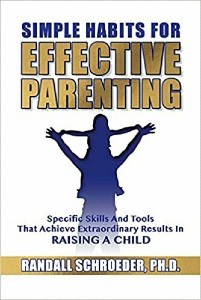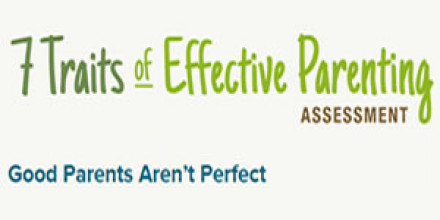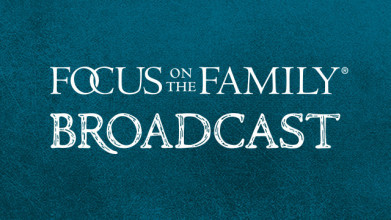
The War of Words
In this Adventures in Odyssey drama, a carelessly uttered word from Eugene creates havoc as it becomes the fashionable insult, resulting in a lesson about the power of words.
Home » Episodes » Focus on the Family Broadcast » More Effective Habits to Embrace in Parenting (Part 1 of 2)
Preview:
Dr. Randy Schroeder: A successful person is no different than anyone else, except they have an extra amount of determination. And so, kids are gonna face challenges. They may get a low test score. They may strike out in Little League. But parents need to believe in their child and reframe that adversity and say, “Well, this is just a new beginning.”
End of Preview
John Fuller: That’s Dr. Randy Schroeder, our guest today on Focus on the Family, talking about how to integrate some great habits into your parenting. Thanks for joining us. Your host is Focus president and author Jim Daly, and I’m John Fuller.
Jim Daly: John, isn’t it true that in the parenting journey there’s those picture-perfect moments when things are going well and you’re patting yourself on the back and your spouse on the back saying, “We are so good at this.”
John: (laughs)
Jim: And then there’s all the other moments where it’s reality and you’re saying, “What am I doing? Am I doing harm? Why did I say that?” And, uh, you know, it’s just so, uh, much the parenting story. And today we’re going to talk with our guest about those core things that you need to do as a parent, uh, to really help that child grow up healthy. And I think, you know, when you look at it, for Jean and I, it’s “Are we being too passive, are we being too strict?” All those kinds of questions. And today we’re going to answer those with our guest.
John: I’m looking forward to the conversation. Dr. Randy Schroeder is a marriage and family counselor, a pastor, and a former seminary professor of pastoral counseling. Uh, he and his wife Ginny have been married for 47 years. They have tow married sons, six grandchildren. And, um, Randy has a great passion, and you’ll hear more about that as we explore one of his great books. It’s called Simple Habits for Effective Parenting: Specific Skills and Tools that Achieve Extraordinary Results in Raising a Child. And stop by focusonthefamily.com/broadcast for your copy of the book. Or call 1-800, the letter A, and the word FAMILY.
Jim: Randy, welcome back to Focus.
Dr. Randy: Well, thank you for having me back. I appreciate you, and Focus on the Family helping marriages, parents and families thrive in Christ. That’s great.
Jim: You’ve read it.
John: (laughs)
Dr. Randy: Yeah, I’ve read that.
Jim: That’s our mission statement.
John: We do try to do that every day. Yeah, that’s great. Thank you for the homework you’ve done.
Dr. Randy: You’re very welcome.
John: Hey, um, on that kind of, uh, opening that we talked about there, somebody once said to me, “You know, parenting is so hard. God had two children, Adam and Eve, and they did- they kind of took the wrong steps.” I mean, that’s kind of fascinating to think about, right?
Dr. Randy: Well, it- parenting can be a challenge. And yet I think if we have, uh, the right skills and the right words and actions and knowledge, parenting can be, uh, less stressful, and parents can effectively lead and guide their kids, uh, to being confidence, capable, responsible, godly decision makers.
Jim: You know, Randy, once of the things that we hear here at Focus is the parents apply the formula, you know, do these things, and then we hear where it didn’t turn out so well. I think that’s in the minority of circumstances. But speak right at the front here. Let’s talk about these ideas, which I think, you know, our listeners, our viewers, have really responded to your content. It’s straightforward. I love the relational aspect of what you talk about, maintain that relationship. We’re going to get into all of that. But right at the forefront here, that idea that if I do A, B and C, that I get D. It doesn’t always work that way, does it?
Dr. Randy: That is so correct because, uh, we can’t control outcomes. All we can do is influence our kids’ hearts, parents can influence a heart to help a youngster, uh, learn obedience and learn good decision-making skills. And then hopefully, that will translate into good decision-making when they’re, uh, throughout their, uh, formative years with their parents. And even more importantly, from the ages of 18 to 100 as adults, they’ll be good decision makers. But you’re right, we cannot control the outcome.
Jim: And, and on the opposite side of that, it doesn’t give parents a free pass to be lazy in their parenting. I mean, you want to lay the foundation so that they have the most predictive outcome. And, and that’s the key. There’s no guarantee. But if you do these things consistently, it’s more likely that your child will have a healthy spiritual life, uh, and life in general, right?
Dr. Randy: Yes sir, Jim. That is so true. And often, parents just don’t have the knowledge. A desire to be a parent, uh, is great. Motivation is great. But what really makes the difference is knowing how to build a strong parent-child relationship. Knowing how to lovingly, meaningfully, uh, apply the rules so that a parent can ask, “Is this discipline decision going to help my child be a better decision maker?” Uh, knowing how to help kids overcome, uh, chemicals and avoid the temptations in the world. And so Simple Habits for Effective Parenting gets to the specifics. It’s not concepts and principles. And sadly, that’s what parents are often, uh, coming across. And they’re not coming across specifics that can make a huge difference in the life of their child.
Jim: Excellent. And we’re going to start talking about the foundation building and, uh, you do such a good job in helping parents better understand that. Of course, you’ve worked with parents and their children for years as a counselor, so you bring all that experience into the discussion.
Um, setting that good foundation, speak to the three qualities that you have seen are most important to strengthen your child’s development.
Dr. Randy: It’s important, I think, uh, for a parent to think about their child at the age of 25, 35, 45, whatever. What qualities does a parent hope their child possesses at those adult ages and, and throughout their adult life? And certainly, we can say the Fruit of the Spirit; Love, joy, peace, patience, kindness, goodness, gentleness, faithfulness, self-control. Those are all very, very important. But what I truly think makes a difference, uh, in the life of the child, are three essential qualities, uh, especially in today’s society. And I’m gonna talk a little about each. The first is morals based on the bible. Secondly would be building a strong internal character within a child. And then a third is determination. And so, morals based on the bible is where it begins. Uh, in today’s society, people make decisions on feelings. You know, if it feels good, I’m gonna do it. Even though it may go against God’s word and biblical values, uh, and what God wants for us. And so, parents want their children to go into adult life with the absolutes of what is right and what is wrong. The Ten Commandments. Sadly, in 1980, the Ten Commandments were taken out of public schools.
Jim: In 1980?
Dr. Randy: 1980. Yeah, the Supreme Court.
Jim: It wasn’t that long ago, is my point.
Dr. Randy: Yeah, yeah. And so, uh, but parents need to not take, uh, that for granted. In especially today’s society, strengthen a child’s faith in Christ and strengthen morals based on the bible.
Jim: Let me interject there and then we’ll go to the next two. But, you know, in the culture, if, uh, the listeners’ and the viewers’ kids are going to public school, and even in some Christian schools, they- they’re going to get pushback amongst their peers if they say, “Well, I don’t believe in this because the bible says that.” How do we strengthen them in that particular area to be committed to those compass principles that are eternal? That we believe as Christians that God gave us that are immovable. You’re not- the- it’s like gravity. This is just the way it is.
Dr. Randy: That’s a tough question to answer.
John: Yeah.
Dr. Randy: And I think kids just have to come back, and parents too. That we believe firmly in God’s word. And God’s word is the bible. And therefore, we’re going to live by the biblical standards of the bible. And we’re not gonna… A- People today want to say, uh, “Here’s my feelings. God, you conform to my feelings.”
Jim: That is so true.
Dr. Randy: And I think parents need to say, uh, “No. God has set the standard and we’re going to conform to God’s word and that standard.” And that’s what parents, uh, need to convey to their kids.
Jim: I’m telling you right now, with my boys just tipping into their early 20s, those are great discussions with your teenagers.
Dr. Randy: Oh, sure.
Jim: I mean crack that discussion open because they’re capable of talking to you about that dynamic.
Dr. Randy: Yeah, yeah.
Jim: And that fact that we believe this, and therefore we act like this. And it’s just, just go head into it. Don’t, don’t shrink back, would be my encouragement.
Dr. Randy: Totally agree with you.
Jim: Even as a 13, 14, 15-year-old. Um, let’s move to the second one, character. I love that one.
Dr. Randy: Well, and, and kids need a strong internal character. And this, uh, goes back to the morals based on the bible. That strengthening their belief in those values, kind of to your earlier question, Jim, so that, uh, character is the external actions of what a person believes on the inside. Uh, and people with character make responsible, Godly decisions. And so, parents need to work hard to talk about values at mealtimes. As you just said, you know, discussing with your sons. And, and make sure that that character is strong so then their external actions with kids at school and in society are in alignment with God’s word.
Jim: That is so, so good. Character too, I mean, when you look at the bedrock of character, what do you think that is? I mean, what, what is the core thing in developing character? Obviously introducing them to the truth of God’s word, I get that.
Dr. Randy: Mm-hmm.
Jim: But is- What’s that element in the human experience that provides the best garden to grow character?
Dr. Randy: I- I think it comes back to parents and, and what, uh, example is not the best teacher, example is the only teacher. And the more-
Jim: So, parents have to live it.
Dr. Randy: Parents have to live that character. And more things are caught than taught. So, a parent can talk about character, but it’s going to be their example. It’s going to be kids catching, uh, a parent’s character and integrity and seeing that parents are doing what’s right in God’s eyes, they’re not doing what’s right in the world’s eyes. And, and so then kids will absorb that.
Jim: That’s really good. And again, it’s not that complicated. I mean, it may be hard to do. But it’s not complicated. (laughs)
Dr. Randy: No. Parents need to recognize kids are emotional sponges and they breathe in the family air.
Jim: Boy, that’s good.
Dr. Randy: And so, they’re going to breathe in a parent’s character.
Jim: That’s really good. Okay, third is determination.
Dr. Randy: That- That one is significant. Everyone in life has setbacks, adversity, it just happens. Uh, my synonym for determination is positive attitude. Someone with a positive attitude is determined. Someone who’s determined has a positive attitude. I don’t know you two men, Jim and John personally. And yet I can guarantee the two of you, myself, we have been knocked down. We’ve had setbacks in our lives. We’ve had many unfair things happen in our lives. And yet, we need to be men of bounce, and bounce back up and, and stay determined. Uh, a successful person is no different than anyone else, except they have an extra amount of determination.
Jim: Hmm.
Dr. Randy: And so, kids are going to face challenges. They may get a low test score. They may strike out in Little League. Whatever it is, kids are going to have adversity just as the three of us had adversity and every person in life. But parents need to believe in their child and reframe that adversity and say, “Well, this is just a new beginning. We’re going to have a fresh start here. Next time you’re going to do better on that quiz. And, and, and this is an opportunity to, uh, to work hard, and to succeed, and have that persistent effort.” And parents then can also say, uh, you know, “I believe in you. I’ve got confidence in you that you’re going to stay determined. You’re not going to give up.” That is just so essential.
Jim: And those are three, again, good, basic, foundational truths about buildings into your child, that morals based on the bible, character, determination.
Moving forward, you speak to mutual respect and the importance of that as a parent with your relationship with your child. Um, some might say, and I would imagine as a counselor you see this pretty consistently, this might be probably the biggest, would be my assumption, the biggest reason there’s disruption in the parent-child relationship. The lack of mutual respect and dialogue. And kids jump on that, respond to it out of their emotional tank. And parents do too. And I’m guilty of it. I mean, there were times, and our oldest was a very strong-willed child.
Dr. Randy: Mm-hmm.
Jim: And so, he was able to lasso me often and get me down into that argument, you know-
Dr. Randy: (laughs)
Jim: Where I had to shake it off and go, “What am I doing? Arguing with my nine year old?” But speak to that mutual respect and the importance of it.
Dr. Randy: Well, I think, and- and you’re, and Jim, there are no perfect parents, of course. And there’s no perfect kid.
Jim: Thanks for repeating that, that’s an important…
Dr. Randy: You gotta al- You gotta always, aways keep that in mind.
Jim: Say it again. (laughs)
Dr. Randy: And, and what does Matthew 7 say? Treat others as you want to be treated. And, and yet, I think-
Jim: Does that include your kids? (laughs)
Dr. Randy: I think a lot- You’re right. Yeah. I think a lot of-
Jim: That’s the attitude.
Dr. Randy: A lot of times, parents can think, “Well, my children need to respect me, but I don’t really always have to respect them,” and that’s not true. And, and a child treated with disrespect often misbehaves.
Jim: Well, think of that.
Dr. Randy: It’s just- It- It- It’s just interesting that parents that are disrespecting their kids, uh, being sarcastic, putting them down, uh, not listening well, uh, breaking their promises. Uh, when respect is not there, then kids misbehave. And yet mutual respect, like you said Jim, is critical for kids to trust their parents. When a child has respect for their parents, they trust that their parent has their best interest at heart. And that- And then that causes the child to listen that, “Hey, my dad and mom have my best interest at heart. I respect them.”
Jim: That is so good. There’s a news commentator, opinion guy who said this, uh, one time, and I caught it ‘cause I thought it was so profound. He said, “You know, it’s come down to where half the country love their dads, the other half hate their dads.”
Dr. Randy: Mmm.
Jim: Isn’t that an amazing insight? Because what you’re describing is if that kind of relationship does not exist in childhood, when they’re young adults, they are typically bringing into that experience a lot of baggage.
Dr. Randy: Yes, sir. That’s so true.
Jim: Of, you know, lack of respect for authority. You know, just all those things that can work against a person having a healthy attitude about life.
Dr. Randy: Yeah, yeah, yeah. No, that is true. And a child’s picture of our heavenly father is their picture of their dad, often. And so, uh, and it begins again with mutual respect.
John: Hmm. Well, this is Focus on the Family with Jim Daly. And today, our guest is Dr. Randy Schroeder. Uh, we’re talking about some basic parenting stuff that, uh, all of us either need to know or be refreshed about. And, uh, there is so much here in his book, Simple Habits for Effective Parenting. Get your copy from us here. Call 800, the letter A, and the word FAMILY. 800-232-6459. Or stop by focusonthefamily.com/broadcast.
Jim: Randy, you mention, um, avoiding parenting extremes. And I think it’s really important to cover this because, uh, this too is so core to our experience as parents. You say that you don’t want to be that controlling or overprotective, or permissive parent. So, hit those three quickly.
Dr. Randy: Well, the… And let my just start out by saying, the bible says, “Children obey your parents in everything, for this pleases the Lord.” So Christian parents want to seek to obedience because that leads to good decision making. And yet, loving Christian parents can fall into these extremes controlling. Wanting to control every aspect of a child’s life. And controlling parents often are loving, but they’re focused on short term behavior.
Jim: Can I- Let me interject. I- I’m hearing mom go, “But Randy, do you know the culture they’re in? I have to control things because I need to protect them.”
Dr. Randy: And, and that’s, that’s the second extreme, being overprotective.
Jim: (laughs) Okay.
Dr. Randy: But yeah, no, par- parents think that that’s the case. And the thing is, when parents control their children, those kids often do not become good decision makers.
Jim: Because they don’t grow up.
Dr. Randy: Yes sir, you’re right. They don’t grow up. They don’t, uh, increase their self-confidence. They don’t believe they’re capable. They think, you know, “I’m, I’m kind of incompetent.” And so, it’s extremely important for parents to seek obedience and good decision making, not try to control every aspect of a child’s life.
Jim: Can I ask you this? Just so parents have a sense of self-awareness, cause I’m not sure that we do. And Jean and I sometimes, we’re over controlling. It’s- You know, you’re bouncing along a perfect line and you’re not always on that line, so you’ve gotta be able to have some self-reflective ability to say, “Okay, that, I was not in the right spot at that moment.” For that parent that may not see that they’re controlling, what would be that environment? What would it look like where you have to take the self-assessment to say, “Okay, I’m not in a healthy place with this.”?
Dr. Randy: Well, I, I think they’re probably doing too much talking. And we may talk a little bit about that later-
Jim: Yeah, we will.
Dr. Randy: … and too much directing of the child. And I, I think ki- uh, parents need to be like Jesus. Jesus asks 307 questions in the bible. Socrates, the Socratic Method is asking questions. I th- And so I think rather than parents wanting to control and just direct this and direct that, they need to let their child speak out loud what they are thinking. And then if it’s not healthy, then parents can kind of redirect them.
Jim: All right. Then overprotective, just a quick description.
Dr. Randy: Oh, overprotective is just thinking that a, a parent needs to protect a child from the physical bumps and bruises in life, and even the emotional bumps and bruises in life. And they rush in right away. When a youngster falls down, an overprotective parent rushes in right away to take care of that child. And, and they need to let the child handle that bump and bruise on their own. That strengthens them.
Jim: Yeah, it’s so, so good. You also have the Amazing As. I want to cover this basic stuff, and then the rest of today and next time, we’re going to get into more depth here.
Dr. Randy: Okay.
Jim: What are the Amazing As?
Dr. Randy: Well, the first one is acceptance. Kids need unconditional love. And that’s what acceptance is. Uh, God says to every Christian person, “I love you. And I will always love you. And sometimes I don’t- or I don’t approve of your sinful thoughts, words and actions.” And likewise, a parent needs to use, I say, run-on sentences. And use that word and, and say, “I love you and I’ll always love you. And I don’t approve of your missteps or your mistakes.” So that a kid, a youngster knows that, “Mom and dad love me. They want- have my best interest at heart. They want me to become confident. A good decision maker.”
And then, uh, another A, uh, is attention. Kids need attention from mom and dad. And that’s just not being in the home. So many dads especially, but could be moms, think, “If I’m in physical proximity with my child, I’m giving them attention.”
Jim: Check that box. Right.
Dr. Randy: Check that box. No, it has to be… They eyes are windows to the heart.
Jim: Hmm.
Dr. Randy: It needs to be looking into a child’s eyes. Having dialogue. Encouraging a child.
Another A that’s so very important is appreciation. And telling a child, we may talk a little more about that later, but, uh, what they appreciate about the child. “Thank you,” I define as gratitude. Good to tell a child, “Thank you for doing this, thank you for saying that.” It’s even more important to say, “I appreciate.”
Jim: Mmm.
Dr. Randy: And then affection. Affection is absolutely huge. And parents need to think of affection as verbal and physical affection.
Jim: Mmm.
Dr. Randy: That is what makes a huge difference. It’s not… 70% of adults I’ve counseled, uh, have told me that they did not receive both verbal and physical love from their parents growing up.
Jim: Yeah. You know that idea of that, uh, physical expression is so critical.
Dr. Randy: Oh, it’s huge.
Jim: And I really want to hit that because I think sometimes parents pull back. Especially as the children get older.
Dr. Randy: Yes, sir.
Jim: And my- my oldest, he just, he didn’t know how to hug. He was like a piece of cardboard. And I actually did teach him how to hug.
Dr. Randy: Good for you. That’s terrific.
Jim: And he’s a great hugger today.
Dr. Randy: That’s terrific.
Jim: But um, but describe- I think you had a conversation with a father whose son was shoplifting or something like that.
Dr. Randy: Yes, sir.
Jim: And how did that expression of affection change his attitude? The son’s?
Dr. Randy: It- it was absolutely an amazing story. Uh, the- it was sadly a divorce, and the mom had custody of the two boys. And the 13 year old had an older brother. Both the boys were getting in trouble with the law. They were having behavioral issues at school. They weren’t getting good grades. They were struggling there. They did not have healthy friendships. And the older son actually then started doing cocaine. And the mom said, “You know, I’m not doing the job. I’m gonna give the 13 year old to our son’s dad and see if he can turn him around.” Well, the 13 year old came to live with dad the last Friday of May. Sunday, the 13 year old stole a bicycle in the neighborhood. (laughs) Two days later.
Jim: So, he was on that bad track as well.
Dr. Randy: He- he- he wasn’t off the bad track yet. Well, the dad immediately called me and I met with the dad and the son. And I actually, going back to that appreciation, I had the dad give the son a big compliment to start the session. To say, “I appreciate this about you.” And then, I met with dad privately. And I asked dad to go for a walk every single day throughout this summer when his son was not in school and mentally keep track, touch your son 12 times every time you go around the block. Lovingly squeeze his arm, pat him on the back, tousle his hair, give him a half hug when you’re walking. And also give him an appreciation vitamin. By the end of the summer, that young man had become a responsible decision maker.
Jim: What did he- what-
Dr. Randy: Now, does he still make mistakes? Yeah.
Jim: Sure, but- but explain from a counselor’s perspective, what changed in the young man’s heart?
Dr. Randy: Well, and I don’t want parents to think that, “Oh my goodness. Dr. Schroeder just said all I have to do is give a lot of touch to my youngster and they’re gonna be good decision makers.” It’s more than touch. But touch, what’s the old cliché, is worth a thousand words.
John: Well, it opens the window of the heart.
Dr. Randy: It- it does. And we think about Jesus in the bible. 22 times when Jesus healed people, he touched them to show us the importance of touch. Now, could Jesus have healed them without touch? Well, certainly! He’s God. But Jesus touched them. And so, I think that touch emotionally bonds a parent and child together. And, and, and I tell you I saw the dad-
And the other thing I went over the simple, yet very effective habits. This knowledge not concepts and principles in- in Simple Habits for Effective Parenting book. And I went over that with this dad, and he started applying that with his son. Learning how to lovingly set limits and apply discipline. And lovingly how to build a strong parent-child relationship and everything else. And it just turned that young man’s life around.
Jim: No, it- it’s so good. And again, we’re laying foundations that are predictive outcomes, but not guaranteed outcomes.
Dr. Randy: Exactly, exactly.
Jim: Just to repeat what we said at the beginning.
Dr. Randy: Yes, sir.
Jim: Randy, this has been so good. And we got more to cover, so let’s come back next time and dig a little deeper into this whole area. But I know parents are going to be profoundly helped in this way. And this is all bible based material. I mean, you’re not making this up out of thin air. These are things that you’ve put together as a counselor, trained in that area. And the biblical perspective on how to apply those great truths that the Lord has given us. And I love it. Even with, uh, you know, kids in their 20s right now, thinking back, “Yeah, we did that pretty well. We could’ve done that better.” But one thing that Jean and I always say to each other is, “I just wish we had more information back when.” And so, for the back when parents, when you have kids that are five, six, seven years old, man is this material ripe for you. And if you’re the grandparent listening or watching today, get this resource for your adult kids and talk to them about it. Send them a copy of the broadcast as well. But, uh, thank you, Randy, for being with us.
Dr. Randy: Thank you very much for having me. And I want your listeners to know as well, my wife and I made mistakes.
Jim: Really? (laughs)
Dr. Randy: We didn’t- We did not do it. You use that dirty word, “perfectly.” All parents make mistakes.
Jim: So true.
Dr. Randy: All healthy Christian parents have regrets. And yet, when we have the knowledge, specifics, not concepts and principles, it can make a huge difference.
Jim: Well, you know, one- one way to kick of that journey is an assessment that we have on our website called 7 Traits of Effective Parenting. It takes a few minutes to do it and it will point out some of those areas where you’re really doing it well and some areas to improve in.
John: Yeah, a lot of people have found it to be a really helpful, free assessment.
And then we have Dr. Schroeder’s great book, Simple Habits for Effective Parenting right here at Focus on the Family.
Jim: And you know, the great thing about getting it from us? Those proceeds go right back into ministry. We’re not paying shareholders. I know it’s an easy one button click, but let’s do ministry together.
As we approach the holidays, it’s more important than ever to share the hope that Jesus Christ came to give us all. With overwhelming inflation and high cost for food and fuel and political turmoil and continued health concerns, families are struggling.
John: Yeah, this is a tough time of year for so many people. There are couples, uh, heading for divorce, they don’t see any way out. Parents who are just stressed, um, so much. There are moms considering abortion, and so many others who are really seeking help. Thousands of people reach out to Focus on the Family by mail, by phone, by email, looking for answers.
Jim: They do, and we want them, and you, to continue to make that contact with us. That’s why we’re here. And this time of year is also an opportunity to come alongside those facing challenges and give families hope through your support of Focus on the Family. Your prayers and financial gifts provide scripture based resources and programs to help save and strengthen families.
Uh, when you donate today, a gift of any amount, we’ll send you a copy of Dr. Randy’s book, Simple Habits for Effective Parenting, as our way of saying, “Thank you for partnering with us in ministry.”
And right now, through a special year end matching opportunity, your gift will be doubled dollar for dollar. So, a 25 dollar donation is 50 dollars. God will use your gift to bring healing and redemption to twice as many families. So, on behalf of the families that you’re going to help through Focus on the Family, let me say thank you.
John: Donate and get your copy of Simple Habits for Effective Parenting when you call 800, the letter A, and the word FAMILY. 800-232-6459. Or online, you’ll find us at focusonthefamily.com/broadcast.
On behalf of Jim Daly and the entire team, thanks for joining us today for Focus on the Family. I’m John Fuller inviting you back as we continue the conversation with Dr. Randy Schroeder, and once more help you and your family thrive in Christ.

Dr. Randy Schroeder is the author of the 2020 three-time national award-winning Christian marriage book, Simple Habits for Marital Happiness and the 2021 two-time national award-winning Christian parenting book, Simple Habits for Effective Parenting. Schroeder is a marriage and family counselor, pastor, and former seminary professor for nearly 25 years. He and his wife, Ginny, have been married since 1975 and have two married sons and seven grandchildren. Learn more about Dr. Schroeder at his website, DrRandySchroeder.com

Receive the book Simple Habits for Effective Parenting and the audio download of the broadcast "More Effective Habits to Embrace in Parenting" for your donation of any amount! And now through a special matching opportunity, your gift will be DOUBLED, dollar for dollar!

There's no parenting formula to follow, but there are ways you can grow every day. This assessment gives parents an honest look at their unique strengths, plus some areas that could use a little help.

Visit our online store and purchase a CD of today's program for yourself or to share with a friend.

This new special edition giclée called What Matters Most by artist Morgan Weistling features a portrait of praying with children at bedtime.

Focus on the Family President Jim Daly shares about asking his kids to grade his parenting. This can be a meaningful and growing experience for you and your kids.

Playing games and doing activities with our kids is a fantastic opportunity to connect with them.

Randy Schroeder offers moms and dads practical guidance for leading their children in a loving, confident manner by building on the foundational family principles of relationship, routines, responsibilities, and rules.

What do you know about conscious parenting? Learn more about how this parenting approach and how you can develop a healthy relationship with your child starting with your parenting style.

Dr. Randy Schroeder has counseled thousands of married couples and has discovered simple tools that help couples avoid divorce and build a thriving marriage. In this broadcast, he describes practical habits to help couples navigate expectations in marriage, build emotional closeness, and resolve disagreements.

Dr. Randy Schroeder returns once more to Focus on the Family to discuss habits you can integrate into your marriage! Jim talks to Randy about pursuing the daily essentials of affection in your marriage, promoting emotional closeness, and leaving and cleaving properly.

In this Adventures in Odyssey drama, a carelessly uttered word from Eugene creates havoc as it becomes the fashionable insult, resulting in a lesson about the power of words.

This discussion offers a preview of Volume #16 “Cultures in Conflict” from the That The World May Know video series, available below.

Debra Fileta will help couples better understand the four seasons of healthy relationships, what to expect during each one, and how to carefully navigate them for a stronger marriage. (Part 1 of 2)

Larnelle Harris shares stories about how God redeemed the dysfunctional past of his parents, the many African-American teachers who sacrificed their time and energy to give young men like himself a better future, and how his faithfulness to godly principles gave him greater opportunities and career success than anything else.

Amy Carroll shares how her perfectionism led to her being discontent in her marriage for over a decade, how she learned to find value in who Christ is, not in what she does, and practical ways everyone can accept the messiness of marriage and of life.

Jonathan McKee offers parents practical advice and encouragement in a discussion based on his book If I Had a Parenting Do Over: 7 Vital Changes I’d Make.